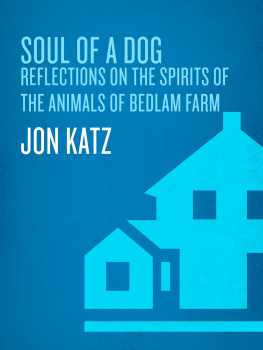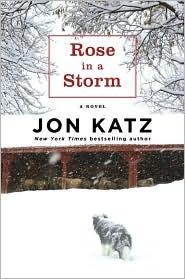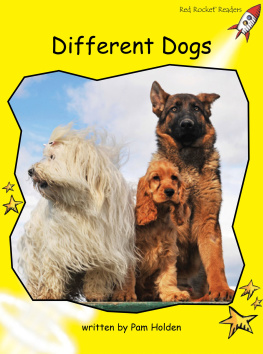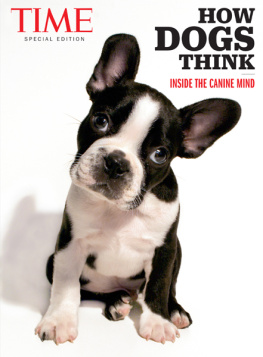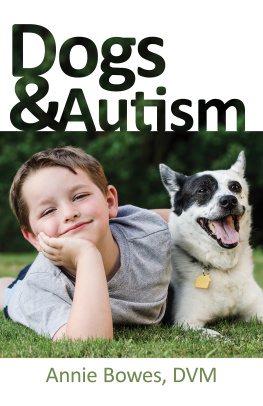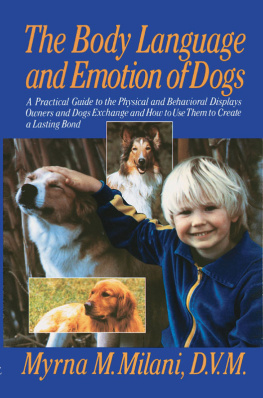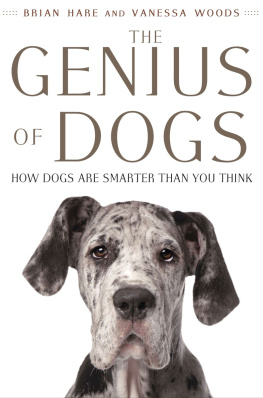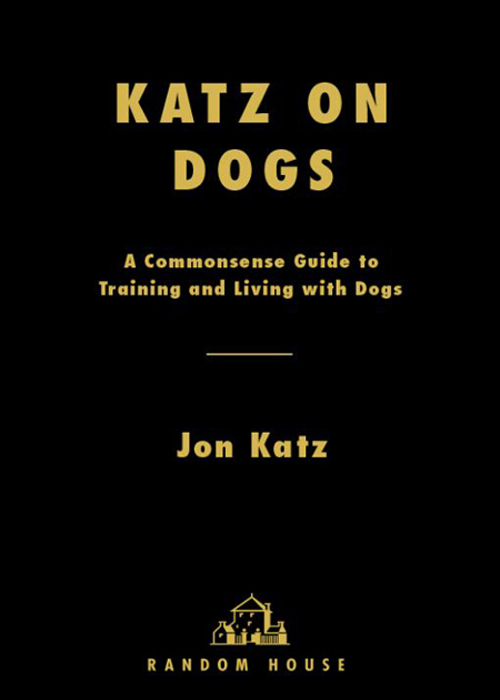
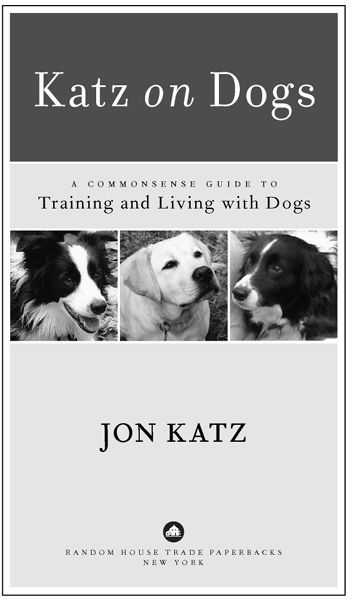
Table of Contents
For Orson,
who rescued me
Animals are a symbol of the rehumanization of society to the extent that they are allowed to function as members of the animal world, rather than as four-footed humans whose very nature is denied, and are permitted to bring their owners into that world of life, impulse, and love.
BORIS LEVINSON, Pets and Human Development

INTRODUCTION
TS 6:30 ON A STICKY, LATE-SUMMER MORNING AT BEDLAM FARM IN upstate New York. The sun will soon dry the wet grass and thin the mist drifting along the mountain rim before me. Although the flies and mosquitoes are still ferocious, the first golden leaves have appeared, a sweet hint of fall.
My dogs and I are deep along a shady forest trail near the farm, the two border collies exploding into the woods after chipmunks, squirrels, anything that movesas always, finding work to do. In contrast, an energetic little puppy is chugging gamely along with a stick in her mouth, happy to stay close by my side. Although Ive only had her a short time, I love her dearly. I think we needed each otheror, to be more precise, I needed her.
Clementine, a ten-week-old fat and happy yellow Labrador, has been on the farm for three weeks. Its going well. Ive never picked a dog more carefully or thoughtfully. She is an appealing, almost irresistible opportunity to try out what Ive learned, mixing research, experience, and my own evolving ideas about training.
Our simple stroll looks mundane, one of the many millions of walks countless dogs and humans take in America every day. But its more than that; for me, its a milestone, a benchmark, another length tacked on to a deepening journey into a life with dogs.
It signifies the painstaking progress Ive made with one complex, troubled border collie who a couple of years ago couldnt walk even a few yards alongside me, and a second whose intensity could easily have made her impossible to live with as a pet. The puppy, seemingly so uncomplicated and eager to please, is actually my neediest dog. Newly arrived, fresh from the litter, shes in urgent need of direction, socialization, affection, and leadership in her still-strange environment with me, my family, my farm, and my other dogs. In these few weeks, much of her future and our relationship will be determined. Weve struck a contract: I will show her how to live in the world; she will give back much more.
So it took a long timeyears, reallyfor this peaceful woodland walk to happen. One only has to look at any park and see sheepdogs obsessed with Frisbees, frantic, out-of-control Labs, plus poorly trained rescue and shelter adoptees to know how enormous a struggle it is to live well with a dog, how easy it is to mess up these extraordinary creatures.
IF HAVING A DOG IS REWARDING ALMOST BEYOND WORDS SOMETIMES, IT can also be daunting, confusing, overwhelming. Dog lovers face countless decisions.
What kind of dog should I have? There are so many breeds and kinds. Can people work and have dogs? How often and for how long can they be left alone? Is it heartless to put a dog in a kennel? Should she come along on vacation? Will she miss us? Will she get lonely? Do dogs get lonely? Is it okay to have only one dog, or should he have company? But if he does, how can we handle a multi-dog household?
Which training method is best? How to housebreak and socialize? Are choke chains and shock collars okay? Are crates cruel? Do I need to play alpha dog and show her whos boss? Or should I be so positive that I never raise my voice? How can I exercise her in a lawsuit-crazy world where dogs are banned from almost every public place? How can I walk her instead of having her walk me? Does she need extracurricular activities?
Whats normal, natural behavior for a dog, and whats aberrant? Should he have a vegan diet? Or an organic one? See ordinary vets or holistic and other alternative practitioners?
How can I teach him to be appropriate with people and other dogs? How do we know if hes aggressive? What if he bites somebody? Is it cruel to find a new home for a dog that isnt happy and is driving me crazy?
What are our dogs thinking, anyway? Are they really members of our family, children with fur? Can they really love and understand us, read our minds, know our moods? What is at the heart of this profoundly rich, ancient connection, the human-canine bond, perhaps the closest we humans will ever forge with another species?
What problems from our own lives do we bring to our relationships with dogs? Can we train and understand dogs without understanding ourselves?
How can we manage the dog love many of us feela powerful social and cultural forceyet keep our human lives in balance?
And, as we love dogs in more complicated ways and find separating from them increasingly difficult, one of the most fraught questions will inevitably arise: When should their lives end? Often that, too, is our decision to make.
These are some of the questions I want to address in this book.
To me, our late-summer walk represented a lot of research, a lot of talking and reading and thinking about and living through these issues. It also represented a lot of workon sweaty days and freezing ones, through sunburn and bug bites, with patience, concentration, and observationso much that it sometimes staggers me to think about it. I often screwed up, and still do regularly, and so do my dogs, but we never quit on each other.
Ive had dogs around my whole life. When I was in fourth grade, I waited outside a school entrance on a bitter winter morning because a puppy was being given away to the first kid in line. I won and I lost: I got to take the dog home, but Lucky soon died from distemper. Next came Sam, the willful basset hound who pushed me out of bed on chilly nights, and King, my brothers German shepherd who rampaged through the neighborhood and brought home swatches from mailmens pants. We never thought to deal with his attacks, nor did anybody suggest we should.
In that not-so-distant time, dogs lived on the periphery of family life, not at the center. They came and went, tormented milkmen and postal workers, scattered garbage, had riotous sexual encounters, never knew a leash, rarely saw a vet. They wandered great distances and sometimes came back, sometimes not. Today, many people would consider such treatment abusive.
Still, in my troubled family, dogs were very important to me; their memories still comfort and haunt. Students of the human-dog relationship have long understood that dogs are outlets for our affection, reflections of our own emotions, and these are among the reasons we treat them so uniquely in a society where detachment is commonplace. Dogs were a vital source of love and stability for me when I was young, and they still are. Ive always felt a sense of gratitude and debt toward them.
I crossed from being a dog owner to a true dog lover in my forties, when I left corporate life to become a writer. Id had a genial, allergy-ridden golden retriever named Clarence, bought from a pet store as a surprise for my baby daughtera classically dumb way to acquire a dog.
Clarence, whose life ended after eight years due to severe kidney disease, was plagued by behavioral and health problems. Not that I had to deal with many of them: I went to work before dawn and returned late, and our relationship consisted mostly of weekend walks and some ear-scratching at night.
Next page


